6 nov 2015
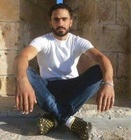
Salama Mousa 23
A Palestinian young man was killed and 38 others were wounded along the eastern borders of Gaza Strip Friday afternoon during confrontations with Israeli occupation forces (IOF).
Dr. Ashraf al-Qudra, the health ministry spokesman, said that the 23-year-old youth Salama Mousa was killed by IOF bullets east of Khan Younis in southern Gaza Strip while the number of those injured rose to 38 by the evening hours.
Eyewitnesses said that groups of young men demonstrated against IOF atrocities in eastern Khan Younis and were met with heavy gunfire on the part of the IOF troops. They said that Mousa was hit in his torso while four others were injured with live bullets.
The PIC reporter said that a 40-year-old paramedic was injured with a teargas canister in his head in the clashes to the east of Breij refugee camp while a young man was reportedly in critical condition due to gunshot wounds.
A Palestinian young man was killed and 38 others were wounded along the eastern borders of Gaza Strip Friday afternoon during confrontations with Israeli occupation forces (IOF).
Dr. Ashraf al-Qudra, the health ministry spokesman, said that the 23-year-old youth Salama Mousa was killed by IOF bullets east of Khan Younis in southern Gaza Strip while the number of those injured rose to 38 by the evening hours.
Eyewitnesses said that groups of young men demonstrated against IOF atrocities in eastern Khan Younis and were met with heavy gunfire on the part of the IOF troops. They said that Mousa was hit in his torso while four others were injured with live bullets.
The PIC reporter said that a 40-year-old paramedic was injured with a teargas canister in his head in the clashes to the east of Breij refugee camp while a young man was reportedly in critical condition due to gunshot wounds.
5 nov 2015
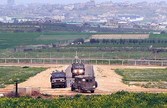
A number of Israeli tanks and bulldozers Thursday morning rolled into east of Khuza’a town, south of Khan Younis, and carried out leveling operations of Palestinian farmland.
Palestinian local sources affirmed that Israeli military bulldozers backed by a number of tanks moved into the southern borders of Gaza at dawn today.
The sources added that the bulldozers razed Palestinian-owned agricultural land and constructed sand mounds.
Last night, one Palestinian was injured when Israeli soldiers opened fire at Palestinian local homes near the border fence in central Gaza.
Palestinian local sources affirmed that Israeli military bulldozers backed by a number of tanks moved into the southern borders of Gaza at dawn today.
The sources added that the bulldozers razed Palestinian-owned agricultural land and constructed sand mounds.
Last night, one Palestinian was injured when Israeli soldiers opened fire at Palestinian local homes near the border fence in central Gaza.
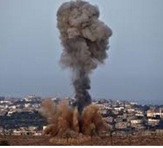
The Palestinian Health Ministry in the Gaza Strip has reported that one Palestinian was injured by Israeli army fire, on Wednesday evening, east of Deir al-Balah, in central Gaza.
The wounded Palestinian was moved to the Al-Aqsa Hospital in Deir al-Balah, suffering a moderate injury.
In addition, the soldiers fired two shells into farmlands, east of Deir al-Balah, and close to a number of homes, and also fired rounds of live ammunition into agricultural lands, adjacent to the border fence.
The Israeli Air Force has also been conducting flights over different parts of the besieged coastal region, and firing flares.
The wounded Palestinian was moved to the Al-Aqsa Hospital in Deir al-Balah, suffering a moderate injury.
In addition, the soldiers fired two shells into farmlands, east of Deir al-Balah, and close to a number of homes, and also fired rounds of live ammunition into agricultural lands, adjacent to the border fence.
The Israeli Air Force has also been conducting flights over different parts of the besieged coastal region, and firing flares.
4 nov 2015
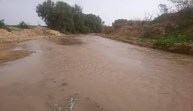
Israeli Occupation Forces (IOF) opened a water dam on Tuesday morning for several hours towards the Palestinian lands in central Gaza Strip despite lack of rain water.
Palestinians of Wadi al-Salqa to the east of Deir al-Balah city said that great damage and financial losses were resulting from flooding of their lands and winter plantings.
Israeli forces opened the same dam along with other dams on Gaza borders last winter causing severe damage to the houses and lands of inhabitants.
Palestinians of Wadi al-Salqa to the east of Deir al-Balah city said that great damage and financial losses were resulting from flooding of their lands and winter plantings.
Israeli forces opened the same dam along with other dams on Gaza borders last winter causing severe damage to the houses and lands of inhabitants.
3 nov 2015

A Palestinian citizen sustained wounds afternoon Monday in a wave of violent confrontations with the Israeli occupation patrols in eastern al-Bureij refugee camp, in central Gaza Strip.
Spokesperson for the Gaza-based Health Ministry, Ashraf al-Qudra, said a Palestinian youngster was shot and injured by the Israeli occupation troops in his feet and was rushed to hospital shortly afterwards.
Over recent weeks, violent clashes with the heavily-armed occupation soldiers have rocked eastern al-Bureij refugee camp, leaving scores of Palestinian civilians, including children, severely wounded.
Spokesperson for the Gaza-based Health Ministry, Ashraf al-Qudra, said a Palestinian youngster was shot and injured by the Israeli occupation troops in his feet and was rushed to hospital shortly afterwards.
Over recent weeks, violent clashes with the heavily-armed occupation soldiers have rocked eastern al-Bureij refugee camp, leaving scores of Palestinian civilians, including children, severely wounded.
2 nov 2015

Israeli navy forces on Monday opened machinegun fire at Palestinian fishermen in Gaza sea.
Local sources reported that a number of Israeli navy gunboats fired in the morning hours at the Palestinian fishing boats which were sailing in Gaza sea.
The heavy shooting forced the Gazan fishermen to leave the sea and end fishing with no casualties reported, the sources added.
The attack is another episode in the series of Israeli daily violations of the Cairo-brokered truce accord signed in the wake of last summer’s offensive on the besieged coastal enclave, which killed over 2,300 Palestinians, mostly civilians.
Local sources reported that a number of Israeli navy gunboats fired in the morning hours at the Palestinian fishing boats which were sailing in Gaza sea.
The heavy shooting forced the Gazan fishermen to leave the sea and end fishing with no casualties reported, the sources added.
The attack is another episode in the series of Israeli daily violations of the Cairo-brokered truce accord signed in the wake of last summer’s offensive on the besieged coastal enclave, which killed over 2,300 Palestinians, mostly civilians.
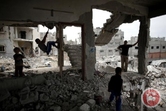
Palestinian children play amid the rubble of their house, on May 11, 2015, which was destroyed during the 50-day Gaza war the summer before.
Ramzy Baroud is an internationally-syndicated columnist, author and the founder of PalestineChronicle.com. His latest book is My Father Was a Freedom Fighter: Gaza's Untold Story.
There is a possibility that you have heard of the famed British author, J.K. Rowling, writer of the popular fantasy series ‘Harry Potter’. While I knew of her books -- through my teenage kids -- I knew little about the author herself, until recently.
Under an oblique title, “Israel needs cultural bridges, not boycotts”, Rowling, along with a few celebrity writers, argued against growing calls for an academic boycott of Israel.
Using generalized, ambiguous terminology that offered little by way of compelling Israel to end its ongoing Occupation in Jerusalem and the West Bank, genocide and siege in Gaza and protracted institutional discrimination against Arabs and other minorities in Israel, she argued for ‘cultural engagement’, instead. Such engagement, her letter reads, “builds bridges, nurtures freedom and positive movement for change. We wholly endorse encouraging such a powerful tool for change, rather than boycotting its use.”
The author seems disconnected from the reality of life under Israeli Occupation. On the day of writing this article, I spoke to Ismail Abu Aitah, a young man from Gaza who lost both his parents, his brothers, and one of his nephews when Israel blew up their house in the 2014 summer war. He, too, was badly injured, together with almost every surviving member of his family.
“I am sorry Ramzy, I cannot give you exact dates and times to what has befallen my family,” he messaged me on Skype. “After July 24, 2014, I lost interest in life and stopped paying attention to the passing of time.”
How is one to console Ismail? How is one to console the families of over 2,200 Palestinians killed in the last war; the over 400 in the previous war and over 1,430 in the one before that, in addition to the tens of thousands of wounded and maimed? Not forgetting the many killed in the West Bank this October alone, some executed point blank?
Will J.K. Rowling’s call for engagement suffice?
For her, even non-violent acts of encountering Israel’s ongoing massacres in Gaza and the military occupation in the West Bank are excessive. “Cultural boycotts singling out Israel are divisive and discriminatory, and will not further peace,” reads the letter she signed.
Amnesty International said Israel’s violent response to a burgeoning uprising in Occupied Palestine appears to have “ripped up the rulebook and resorted to extreme and unlawful measures.” But with scores of UN resolutions never respected, Geneva Conventions never honored, and humanitarian laws never valued, Israel has never followed a rulebook, to begin with.
Racism in Israel is so rife that being dark skinned in that country can be a terrifying experience. When a mainstream American newspaper like the Washington Post headlines a news report with “Israeli government to refugees: Go back to Africa or go to prison”, this is an indicator that Israel has a serious problem.
If J.K. Rowling and her peers do not see an urgency in standing up for millions of Palestinians who are enduring daily deaths and discrimination (as they have for 67 years), what is their reaction to the violence against Africans and dark-skinned people, who are beaten by mobs, and abused by police and discriminated against by the government itself?
Imagine life being a thousand-fold worse for Palestinians, a nation that is forced to choose between two terrible fates: permanent destitution and exile on the one hand, or a perpetual war and occupation on the other.
“We will be seeking to inform and encourage dialogue about Israel and the Palestinians in the wider cultural and creative community,” J.K. Rowling’s letter reads. Can those ‘creative’ elites possibly be any more disconnected from reality to the extent that they perceive a nation that stands accused of violating human rights with such impunity for nearly seven decades as one that simply needs a nudge to dialogue?
To expect dialogue with Israeli Prime Minister, Benjamin Netanyahu, who has just dehumanized Palestinians further by accusing them of concocting the Holocaust is not just impractical, but is the very definition of insanity -- seeking dialogue with a belligerent occupier, over and over again, and expecting different results.
Fortunately, J.K. Rowling’s last-minute intervention and her barely concealed defense of Israel arrives belatedly. A defining moment is imminent, as hundreds of scholars in her own country have just enlisted their support for the academic boycott, to be added to the 100 artists who joined the cultural boycott last February and hundreds of universities and academicians in the US who did so last August. These are just a few examples of a massive, non-violent campaign that targets Israeli academic and cultural institutions -- not individuals -- who contribute directly, or otherwise, to the injustice that is meted out against Palestinians daily.
The scholars from the UK, exceeding 300 and the last to join the boycott campaign were, like thousands more, guided by the spirit of the struggle against the former Apartheid South African government. The latter was overcome largely because of the struggle and steadfastness of the South African people and also aided by morally-guided actions of boycotters all around the world, which included J.K. Rowling’s country.
Had the famed author achieved her current status during the height of South Africa’s Apartheid, would she have issued a similar call, declaring her “support for the launch and aims of Culture for Co-existence”, rather than demanding an end to Apartheid, even if it meant severing ties with Apartheid government institutions? At this point, the answer is uncertain.
Last February, the letter from the British artistes read, in part: “During South African apartheid, musicians announced they weren’t going to ‘play Sun City’. Now we are saying, in Tel Aviv, Netanya, Ashkelon or Ariel, we won’t play music, accept awards, attend exhibitions, festivals or conferences, run masterclasses or workshops, until Israel respects international law and ends its colonial oppression of the Palestinians.”
What is appropriate for South Africa should be appropriate for Palestine, too, even if J.K. Rowling and her respected peers find that too objectionable.
The views expressed in this article are the author's and do not necessarily reflect Ma'an News Agency's editorial policy.
Ramzy Baroud is an internationally-syndicated columnist, author and the founder of PalestineChronicle.com. His latest book is My Father Was a Freedom Fighter: Gaza's Untold Story.
There is a possibility that you have heard of the famed British author, J.K. Rowling, writer of the popular fantasy series ‘Harry Potter’. While I knew of her books -- through my teenage kids -- I knew little about the author herself, until recently.
Under an oblique title, “Israel needs cultural bridges, not boycotts”, Rowling, along with a few celebrity writers, argued against growing calls for an academic boycott of Israel.
Using generalized, ambiguous terminology that offered little by way of compelling Israel to end its ongoing Occupation in Jerusalem and the West Bank, genocide and siege in Gaza and protracted institutional discrimination against Arabs and other minorities in Israel, she argued for ‘cultural engagement’, instead. Such engagement, her letter reads, “builds bridges, nurtures freedom and positive movement for change. We wholly endorse encouraging such a powerful tool for change, rather than boycotting its use.”
The author seems disconnected from the reality of life under Israeli Occupation. On the day of writing this article, I spoke to Ismail Abu Aitah, a young man from Gaza who lost both his parents, his brothers, and one of his nephews when Israel blew up their house in the 2014 summer war. He, too, was badly injured, together with almost every surviving member of his family.
“I am sorry Ramzy, I cannot give you exact dates and times to what has befallen my family,” he messaged me on Skype. “After July 24, 2014, I lost interest in life and stopped paying attention to the passing of time.”
How is one to console Ismail? How is one to console the families of over 2,200 Palestinians killed in the last war; the over 400 in the previous war and over 1,430 in the one before that, in addition to the tens of thousands of wounded and maimed? Not forgetting the many killed in the West Bank this October alone, some executed point blank?
Will J.K. Rowling’s call for engagement suffice?
For her, even non-violent acts of encountering Israel’s ongoing massacres in Gaza and the military occupation in the West Bank are excessive. “Cultural boycotts singling out Israel are divisive and discriminatory, and will not further peace,” reads the letter she signed.
Amnesty International said Israel’s violent response to a burgeoning uprising in Occupied Palestine appears to have “ripped up the rulebook and resorted to extreme and unlawful measures.” But with scores of UN resolutions never respected, Geneva Conventions never honored, and humanitarian laws never valued, Israel has never followed a rulebook, to begin with.
Racism in Israel is so rife that being dark skinned in that country can be a terrifying experience. When a mainstream American newspaper like the Washington Post headlines a news report with “Israeli government to refugees: Go back to Africa or go to prison”, this is an indicator that Israel has a serious problem.
If J.K. Rowling and her peers do not see an urgency in standing up for millions of Palestinians who are enduring daily deaths and discrimination (as they have for 67 years), what is their reaction to the violence against Africans and dark-skinned people, who are beaten by mobs, and abused by police and discriminated against by the government itself?
Imagine life being a thousand-fold worse for Palestinians, a nation that is forced to choose between two terrible fates: permanent destitution and exile on the one hand, or a perpetual war and occupation on the other.
“We will be seeking to inform and encourage dialogue about Israel and the Palestinians in the wider cultural and creative community,” J.K. Rowling’s letter reads. Can those ‘creative’ elites possibly be any more disconnected from reality to the extent that they perceive a nation that stands accused of violating human rights with such impunity for nearly seven decades as one that simply needs a nudge to dialogue?
To expect dialogue with Israeli Prime Minister, Benjamin Netanyahu, who has just dehumanized Palestinians further by accusing them of concocting the Holocaust is not just impractical, but is the very definition of insanity -- seeking dialogue with a belligerent occupier, over and over again, and expecting different results.
Fortunately, J.K. Rowling’s last-minute intervention and her barely concealed defense of Israel arrives belatedly. A defining moment is imminent, as hundreds of scholars in her own country have just enlisted their support for the academic boycott, to be added to the 100 artists who joined the cultural boycott last February and hundreds of universities and academicians in the US who did so last August. These are just a few examples of a massive, non-violent campaign that targets Israeli academic and cultural institutions -- not individuals -- who contribute directly, or otherwise, to the injustice that is meted out against Palestinians daily.
The scholars from the UK, exceeding 300 and the last to join the boycott campaign were, like thousands more, guided by the spirit of the struggle against the former Apartheid South African government. The latter was overcome largely because of the struggle and steadfastness of the South African people and also aided by morally-guided actions of boycotters all around the world, which included J.K. Rowling’s country.
Had the famed author achieved her current status during the height of South Africa’s Apartheid, would she have issued a similar call, declaring her “support for the launch and aims of Culture for Co-existence”, rather than demanding an end to Apartheid, even if it meant severing ties with Apartheid government institutions? At this point, the answer is uncertain.
Last February, the letter from the British artistes read, in part: “During South African apartheid, musicians announced they weren’t going to ‘play Sun City’. Now we are saying, in Tel Aviv, Netanya, Ashkelon or Ariel, we won’t play music, accept awards, attend exhibitions, festivals or conferences, run masterclasses or workshops, until Israel respects international law and ends its colonial oppression of the Palestinians.”
What is appropriate for South Africa should be appropriate for Palestine, too, even if J.K. Rowling and her respected peers find that too objectionable.
The views expressed in this article are the author's and do not necessarily reflect Ma'an News Agency's editorial policy.
1 nov 2015
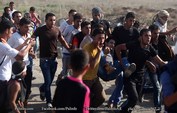
Two Palestinian civilians afternoon Sunday were shot and injured by the Israeli occupation patrols in eastern al-Bureij refugee camp, in central Gaza Strip.
Spokesperson for the Gaza-based Health Ministry, Ashraf al-Qudra, said a Palestinian citizen was injured in his feet by the Israeli occupation troops in eastern al-Bureij and was rushed to the Suhada al-Aqsa hospital in Deir al-Balah to be treated for the moderate wounds he sustained in the attack.
Another Palestinian civilian was also shot and injured in his feet shortly afterwards.
According to a PIC news reporter, the Israeli troops deployed near the apartheid fence, separating the blockaded Gaza Strip from 1948 Occupied Palestine, have resorted to excessive use of armed force against Palestinian youths gathering in the area on a quasi-daily basis.
At least 17 Palestinian civilians were slain by the Israeli occupation forces and hundreds of others have been left wounded across Gaza’s eastern outskirts since the outbreak of the ongoing anti-occupation intifada on early October.
Spokesperson for the Gaza-based Health Ministry, Ashraf al-Qudra, said a Palestinian citizen was injured in his feet by the Israeli occupation troops in eastern al-Bureij and was rushed to the Suhada al-Aqsa hospital in Deir al-Balah to be treated for the moderate wounds he sustained in the attack.
Another Palestinian civilian was also shot and injured in his feet shortly afterwards.
According to a PIC news reporter, the Israeli troops deployed near the apartheid fence, separating the blockaded Gaza Strip from 1948 Occupied Palestine, have resorted to excessive use of armed force against Palestinian youths gathering in the area on a quasi-daily basis.
At least 17 Palestinian civilians were slain by the Israeli occupation forces and hundreds of others have been left wounded across Gaza’s eastern outskirts since the outbreak of the ongoing anti-occupation intifada on early October.
31 oct 2015
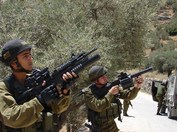
Israeli forces Saturday morning opened its machinegun fire at Palestinian farmers in southern Gaza Strip with no casualties reported.
According to Quds Press, Israeli shooting coincided with unusual moves by Israeli army inside the borderline amid intensive flying of Israeli drones.
Palestinian farmers were obliged to stop working and leave their lands in order to avoid Israeli shooting.
According to Quds Press, Israeli shooting coincided with unusual moves by Israeli army inside the borderline amid intensive flying of Israeli drones.
Palestinian farmers were obliged to stop working and leave their lands in order to avoid Israeli shooting.
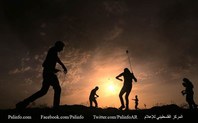
Three Palestinians were injured Saturday evening due to Israeli shooting east of al-Bureij refugee camp in central Gaza Strip.
The PIC reporter revealed that the three injured Gazans were transferred to Al-Aqsa Martyrs Hospital in Deir al-Balah after Israeli forces opened gunfire at a group of Palestinian youngsters. The youths were participating in a demonstration near the Israeli security fence separating Gaza Strip from 1948 Occupied Palestine.
One of the injured had one of his legs broken while two others got injured with shrapnel in their limbs, the PIC reporter pointed out.
Since the beginning of October, 17 Palestinians from Gaza Strip have been killed, 83 injured and 335 suffered breathing problems. 25 Palestinian medics were wounded and 3 ambulances were damaged as well.
The PIC reporter revealed that the three injured Gazans were transferred to Al-Aqsa Martyrs Hospital in Deir al-Balah after Israeli forces opened gunfire at a group of Palestinian youngsters. The youths were participating in a demonstration near the Israeli security fence separating Gaza Strip from 1948 Occupied Palestine.
One of the injured had one of his legs broken while two others got injured with shrapnel in their limbs, the PIC reporter pointed out.
Since the beginning of October, 17 Palestinians from Gaza Strip have been killed, 83 injured and 335 suffered breathing problems. 25 Palestinian medics were wounded and 3 ambulances were damaged as well.
30 oct 2015
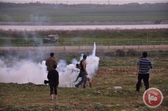
Israeli forces injured at least 46 Palestinians during demonstrations in the Gaza Strip on Friday, including 17 by live fire, hours after Israeli naval forces opened fire at fishing boats off the coast.
Israeli forces injured at least 46 Palestinians during demonstrations in the Gaza Strip on Friday, including 17 by live fire, hours after Israeli naval forces opened fire at fishing boats off the coast. Spokesperson of the Gaza Ministry of Health, Ashraf al-Qidra, said that 17 Palestinians were injured by live fire including a youth hit in the foot during clashes near the Erez crossing in the northern Gaza Strip.
A medic was also injured in the hand when Israeli forces targeted a Palestinian Red Crescent ambulance with live fire in the al-Farrahin area in eastern Khan Younis.
Al-Qidra added that 19 were injured by rubber-coated steel bullets and burns sustained from being hit by tear gas canisters. Ten more demonstrators suffered tear gas inhalation.
The injured were taken to nearby hospitals.
Locals told Ma’an News Agency that the demonstrations erupted in protest of the recent killing of Palestinians by Israeli forces in occupied East Jerusalem and the West Bank, as well as in support of an intifada. An Israeli army spokesperson said that "throughout the day several riots took place on the Gaza border," adding that hundreds of Palestinians attempted to "breach the security fence."
The spokesperson said that Israeli forces opened fire "in order to stop infiltration that would gravely endanger the safety of communities nearby."
Demonstrations in solidarity with Palestinians across occupied Palestinian territory have taken place in the besieged strip on a weekly basis this month.
At least 15 Gazans have been killed by Israeli forces during the demonstrations.
Two Palestinians, a two-year-old and her pregnant mother, were also killed in an Israeli airstrike on their home this month.
Earlier on Friday, Gaza's Ministry of Interior said that Israeli naval forces fired shells at the northern Gaza Strip, damaging land belonging to farmers near Gaza City.
An Israeli army spokesperson had no reports of shelling, but said that Israeli naval forces fired warning shots into the air when vessels "breached a fishing zone in the northern Gaza Strip," adding that the vessels turned back after the warning shots.
Friday's events came after a leader of Hamas -- the governing political power in the Gaza Strip -- said Tuesday that the Palestinians need a national strategy to "protect and escalate" what it termed the "Jerusalem uprising."
Ismail Haniyeh said from Lebanon that the recent upsurge in resistance had "shuffled the cards and hit defeatists.” He also criticized international negotiations for "providing cover to the Israeli occupation."
Ongoing violence has left at least 65 Palestinians and nine Israelis dead since the beginning of the month.
Israeli forces injured at least 46 Palestinians during demonstrations in the Gaza Strip on Friday, including 17 by live fire, hours after Israeli naval forces opened fire at fishing boats off the coast. Spokesperson of the Gaza Ministry of Health, Ashraf al-Qidra, said that 17 Palestinians were injured by live fire including a youth hit in the foot during clashes near the Erez crossing in the northern Gaza Strip.
A medic was also injured in the hand when Israeli forces targeted a Palestinian Red Crescent ambulance with live fire in the al-Farrahin area in eastern Khan Younis.
Al-Qidra added that 19 were injured by rubber-coated steel bullets and burns sustained from being hit by tear gas canisters. Ten more demonstrators suffered tear gas inhalation.
The injured were taken to nearby hospitals.
Locals told Ma’an News Agency that the demonstrations erupted in protest of the recent killing of Palestinians by Israeli forces in occupied East Jerusalem and the West Bank, as well as in support of an intifada. An Israeli army spokesperson said that "throughout the day several riots took place on the Gaza border," adding that hundreds of Palestinians attempted to "breach the security fence."
The spokesperson said that Israeli forces opened fire "in order to stop infiltration that would gravely endanger the safety of communities nearby."
Demonstrations in solidarity with Palestinians across occupied Palestinian territory have taken place in the besieged strip on a weekly basis this month.
At least 15 Gazans have been killed by Israeli forces during the demonstrations.
Two Palestinians, a two-year-old and her pregnant mother, were also killed in an Israeli airstrike on their home this month.
Earlier on Friday, Gaza's Ministry of Interior said that Israeli naval forces fired shells at the northern Gaza Strip, damaging land belonging to farmers near Gaza City.
An Israeli army spokesperson had no reports of shelling, but said that Israeli naval forces fired warning shots into the air when vessels "breached a fishing zone in the northern Gaza Strip," adding that the vessels turned back after the warning shots.
Friday's events came after a leader of Hamas -- the governing political power in the Gaza Strip -- said Tuesday that the Palestinians need a national strategy to "protect and escalate" what it termed the "Jerusalem uprising."
Ismail Haniyeh said from Lebanon that the recent upsurge in resistance had "shuffled the cards and hit defeatists.” He also criticized international negotiations for "providing cover to the Israeli occupation."
Ongoing violence has left at least 65 Palestinians and nine Israelis dead since the beginning of the month.
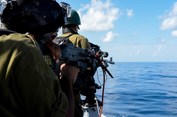
Israeli navy gunboats fired a number of shells at central Gaza Strip on Friday morning, eyewitnesses reported.
They said that the gunboats sailing off the Gaza shores fired intermittent shells at the location of the former settlement of Netzarim.
They said that no casualties were reported in the attack.
They said that the gunboats sailing off the Gaza shores fired intermittent shells at the location of the former settlement of Netzarim.
They said that no casualties were reported in the attack.
29 oct 2015
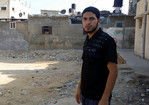
Ahmad al-Hamayda stands at the site of his destroyed home in Khan Younis.
For more than a year, Ahmad al-Hamayda, his six siblings and their elderly parents have been forced to live in a cramped apartment. Their two-story house in Khan Younis, a city in southern Gaza, was totally destroyed by Israel during 2014.
Al-Hamayda had spent all of his 24 years in that house. At the time Israel dropped its bombs, the family had just been evacuated after a neighboring building was hit by a small missile. This was interpreted as a warning that a larger assault on the surrounding area was imminent.
“We turned back to see our home was reduced to rubble,” al-Hamayda said.
Promises have been made by officialdom that the house and others in the neighborhood will be rebuilt with aid from Kuwait. Yet none of the $200 million pledged by Kuwait in Cairo has been made available, according to World Bank data.
“Whenever I go to ask the [Gaza] housing ministry, they keep on delaying things,” al-Hamayda said. “It has been very frustrating.”
As their uncertainty continues, the al-Hamayda family struggles to make ends meet. The United Nations has covered their monthly rent of $200 for the apartment where they now live on just two occasions in the past year. The rest of the time the family has had to pay the full amount themselves.
Their plight is in no way unique.
UNRWA, the UN agency for Palestine refugees, reported last week that 13,167 refugee families in Gaza remain displaced because of the damage done to their homes by Israel’s 2014 attack.
So far, just one refugee family has had its home completely rebuilt, with the agency’s support.
Adnan Abu Hasna, a spokesperson for UNRWA, said that the agency had finished its repairs on some 70,000 homes which had been partially damaged in the Israeli attack.
Shortfall
“We try to give priority to large families in many cases,” he told The Electronic Intifada. Yet he acknowledged that many families have not received any assistance because of a funding shortfall.
Twelve months have elapsed since an October 2014 reconstruction conference for Gaza was held in Cairo. Only around 35 percent of the $3.5 billion pledged to Gaza on that occasion has been made available, according to the World Bank’s most recent data.
Reconstruction has been further hampered by Israel’s refusal to allow many building supplies into Gaza, on the pretext that some items could prove useful to Hamas or other armed resistance groups.
Israel only removed import restrictions on aggregate material required for construction this month. The Israeli authorities are still limiting the amount of concrete, steel bars, electrical goods, pipes and wood thicker than one centimeter that may enter Gaza.
According to UNRWA, aid agencies have to deal with a “lengthy and cumbersome approval process” in order to access essential material.
The World Bank reported last month that UNRWA “claims it incurred $7.5 million in additional costs in 2014 alone, which is equivalent to the cost of building four UNRWA schools, as a result of Israeli requirements on access and monitoring of imported materials into Gaza.”
Living in ruins
For more than a year, Ahmad al-Hamayda, his six siblings and their elderly parents have been forced to live in a cramped apartment. Their two-story house in Khan Younis, a city in southern Gaza, was totally destroyed by Israel during 2014.
Al-Hamayda had spent all of his 24 years in that house. At the time Israel dropped its bombs, the family had just been evacuated after a neighboring building was hit by a small missile. This was interpreted as a warning that a larger assault on the surrounding area was imminent.
“We turned back to see our home was reduced to rubble,” al-Hamayda said.
Promises have been made by officialdom that the house and others in the neighborhood will be rebuilt with aid from Kuwait. Yet none of the $200 million pledged by Kuwait in Cairo has been made available, according to World Bank data.
“Whenever I go to ask the [Gaza] housing ministry, they keep on delaying things,” al-Hamayda said. “It has been very frustrating.”
As their uncertainty continues, the al-Hamayda family struggles to make ends meet. The United Nations has covered their monthly rent of $200 for the apartment where they now live on just two occasions in the past year. The rest of the time the family has had to pay the full amount themselves.
Their plight is in no way unique.
UNRWA, the UN agency for Palestine refugees, reported last week that 13,167 refugee families in Gaza remain displaced because of the damage done to their homes by Israel’s 2014 attack.
So far, just one refugee family has had its home completely rebuilt, with the agency’s support.
Adnan Abu Hasna, a spokesperson for UNRWA, said that the agency had finished its repairs on some 70,000 homes which had been partially damaged in the Israeli attack.
Shortfall
“We try to give priority to large families in many cases,” he told The Electronic Intifada. Yet he acknowledged that many families have not received any assistance because of a funding shortfall.
Twelve months have elapsed since an October 2014 reconstruction conference for Gaza was held in Cairo. Only around 35 percent of the $3.5 billion pledged to Gaza on that occasion has been made available, according to the World Bank’s most recent data.
Reconstruction has been further hampered by Israel’s refusal to allow many building supplies into Gaza, on the pretext that some items could prove useful to Hamas or other armed resistance groups.
Israel only removed import restrictions on aggregate material required for construction this month. The Israeli authorities are still limiting the amount of concrete, steel bars, electrical goods, pipes and wood thicker than one centimeter that may enter Gaza.
According to UNRWA, aid agencies have to deal with a “lengthy and cumbersome approval process” in order to access essential material.
The World Bank reported last month that UNRWA “claims it incurred $7.5 million in additional costs in 2014 alone, which is equivalent to the cost of building four UNRWA schools, as a result of Israeli requirements on access and monitoring of imported materials into Gaza.”
Living in ruins

Jameel al-Bawab outside his rented flat.
Najwa Abuktifa’s husband died three months ago. As a result, she has to look after five teenagers on her own.
The family are living in what remains of their home in Beit Hanoun, a village in the north of Gaza.
“I have no alternative,” she said.
She has been promised $5,000 in aid by the authorities. “I did not receive even one dollar,” she said. “And even the full amount that has been pledged would not be enough to repair my badly damaged home.”
Maryam Hassan, 57, has to share a small rented flat with her four sons, two of whom are married with children. Her husband was also killed when Israel shelled their home in Rafah, near Gaza’s border with Egypt, last year.
The flat is located on the fifth floor of a building. Climbing up to it proves difficult for Hassan, who has osteoarthritis.
“The UN has promised to bring us the construction materials that we need [to repair our home],” she said. “We have been waiting for long time for this promise to come true.”
The home of Jameel al-Bawab, 53, was flattened during what has become known as Black Friday — a 1 August 2014 offensive against Rafah. Between 135 and 200 civilians were killed by Israel in that massacre.
“We lost our belongings, furniture, and more than $7,000,” al-Bawab said.
Last month, he received some aid from Qatar to begin building a one-story home for his family.
Before moving into a flat, he and 14 members of his family had to share three tents between them. Their time in tents lasted more than six months, including an often harsh winter.
Thousands of families in Gaza are facing yet another winter without adequate shelter.
Isra Saleh el-Namey is a journalist from Gaza.
Najwa Abuktifa’s husband died three months ago. As a result, she has to look after five teenagers on her own.
The family are living in what remains of their home in Beit Hanoun, a village in the north of Gaza.
“I have no alternative,” she said.
She has been promised $5,000 in aid by the authorities. “I did not receive even one dollar,” she said. “And even the full amount that has been pledged would not be enough to repair my badly damaged home.”
Maryam Hassan, 57, has to share a small rented flat with her four sons, two of whom are married with children. Her husband was also killed when Israel shelled their home in Rafah, near Gaza’s border with Egypt, last year.
The flat is located on the fifth floor of a building. Climbing up to it proves difficult for Hassan, who has osteoarthritis.
“The UN has promised to bring us the construction materials that we need [to repair our home],” she said. “We have been waiting for long time for this promise to come true.”
The home of Jameel al-Bawab, 53, was flattened during what has become known as Black Friday — a 1 August 2014 offensive against Rafah. Between 135 and 200 civilians were killed by Israel in that massacre.
“We lost our belongings, furniture, and more than $7,000,” al-Bawab said.
Last month, he received some aid from Qatar to begin building a one-story home for his family.
Before moving into a flat, he and 14 members of his family had to share three tents between them. Their time in tents lasted more than six months, including an often harsh winter.
Thousands of families in Gaza are facing yet another winter without adequate shelter.
Isra Saleh el-Namey is a journalist from Gaza.
28 oct 2015
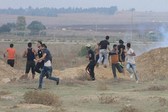
Five Palestinians were shot and injured by the Israeli occupation forces (IOF) afternoon Wednesday in clashes that rocked the Bureij refugee camp, in central Gaza Strip, and the southern West Bank province of al-Khalil.
Three Palestinians sustained injuries in the confrontations that broke out in eastern al-Bureij refugee camp, in central Gaza Strip.
Spokesperson for the Palestinian Health Ministry, Ashraf al-Qudra, said one of the youngsters sustained moderate bullet injuries in his feet.
A Palestinian child was also hit with live rounds in a wave of violent clashes that burst out in Bab al-Zawia, in al-Khalil province.
The Palestinian Health Ministry said the child sustained live bullet injuries and that a bullet lodged in his leg and pelvis.
The minor casualty was transferred to hospital to undergo an urgent surgery.
Another Palestinian civilian was rushed to al-Khalil’s public hospital to be urgently treated for the rubber bullet wounds he sustained in the clashes.
Three Palestinians sustained injuries in the confrontations that broke out in eastern al-Bureij refugee camp, in central Gaza Strip.
Spokesperson for the Palestinian Health Ministry, Ashraf al-Qudra, said one of the youngsters sustained moderate bullet injuries in his feet.
A Palestinian child was also hit with live rounds in a wave of violent clashes that burst out in Bab al-Zawia, in al-Khalil province.
The Palestinian Health Ministry said the child sustained live bullet injuries and that a bullet lodged in his leg and pelvis.
The minor casualty was transferred to hospital to undergo an urgent surgery.
Another Palestinian civilian was rushed to al-Khalil’s public hospital to be urgently treated for the rubber bullet wounds he sustained in the clashes.
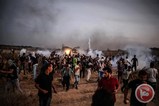
Israeli forces shot and injured a Palestinian protester Wednesday during clashes along the border fence area in the central Gaza Strip, the Gaza-based Palestinian Ministry of Health said.
Spokesperson of the Gaza Ministry of Health, Ashraf al-Qidra, told Ma'an that Israeli forces opened fire at a group of Palestinian protesters east of al-Breij refugee camp, shooting and injuring one in the leg.
Al-Qidra said that the Palestinian was taken to the Shuhada al-Aqsa Hospital in central Gaza Strip in moderate condition.
Protests along the border fence in Gaza have been frequent since the start of the month, during which at least 15 Palestinians have been killed in Gaza alone.
Israeli army spokespeople have reported multiple border breaches during clashes.
Separately a woman who was 5-months-pregnant was killed, along with her 2-year-old daughter, in an Israeli airstrike on the strip earlier this month.
At least 61 Palestinians have been killed since the start of October, in upheaval that the Hamas government in Gaza has encouraged. At least 10 Israelis have been killed by Palestinians during that same time.
Spokesperson of the Gaza Ministry of Health, Ashraf al-Qidra, told Ma'an that Israeli forces opened fire at a group of Palestinian protesters east of al-Breij refugee camp, shooting and injuring one in the leg.
Al-Qidra said that the Palestinian was taken to the Shuhada al-Aqsa Hospital in central Gaza Strip in moderate condition.
Protests along the border fence in Gaza have been frequent since the start of the month, during which at least 15 Palestinians have been killed in Gaza alone.
Israeli army spokespeople have reported multiple border breaches during clashes.
Separately a woman who was 5-months-pregnant was killed, along with her 2-year-old daughter, in an Israeli airstrike on the strip earlier this month.
At least 61 Palestinians have been killed since the start of October, in upheaval that the Hamas government in Gaza has encouraged. At least 10 Israelis have been killed by Palestinians during that same time.
Truce violations List of names Pictures of martyrs
Days: Aug: 26 - 25 - 24 - 23 - 22 - 21 - 20 - 19 - 18 - 17 - 16 - 15 - 14 - 13 - 12 - 11 - 10 - 9 - 8 - 7 - 6 - 5 - 4 - 3 - 2 - 1
July: 31 - 30 - 29 - 28 - 27 - 26 - 25 - 24 - 23 - 22 - 21 - 20 - 19 - 18 - 17 - 16 - 15 - 14 - 13 - 12 - 11 - 10 - 9 - 8
